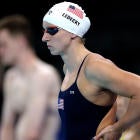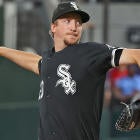
The eight teams in the Ivy League will no longer tackle during football practices after coaches voted unanimously to eliminate all full-contact hitting last week.
According to The New York Times, the move will be adopted officially once affirmed by the league's athletic directors, school presidents and policy committee.
This is the most radical step taken by any league towards reducing the contact players take during practice. Ivy League team Dartmouth eliminated full-contact hitting in practice back in 2010 and has been on the forefront of the safety wave with the introduction of a robotic tackling dummy that allows players to still hit but do so without the same dangers of player-on-player contact.
“At this stage in their careers, these guys know how to hit and take a hit,” Dartmouth coach Buddy Teevens said to The New York Times. “People look at it and say we’re nuts. But it’s kept my guys healthy.”
“It hasn’t hurt our level of play. It’s actually made us a better team.”
Dartmouth has finished third, second and tied for first the last three years even with the elimination of tackling in practice. The Ivy League as a whole had already significantly reduced the amount of contact in practice in recent years and now will just make the move to eliminate it completely.
The goal is simple: Reduce the number of hits the players give and take to cut down on concussions, subconcussive hits and injuries over the course of the week.
“[Research on limiting contact in practice] all shows that you not only have fewer subconcussive hits, but also concussions,” said Dr. Robert Cantu, the co-director of the Center for the Study of Traumatic Encephalopathy at Boston University, to the Times. “It’s not rocket science.”
The move is a major step towards improving player safety within the Ivy League, and it will be interesting to see if any other leagues adopt similar policies at the lower levels of college football.
While it's hard to imagine those at the FBS level making this dramatic a change to practice policy, if the Ivy League shows that players are significantly healthier after this move, then maybe it can be the catalyst for changes in other leagues as well.















